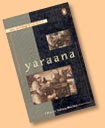
 Yaarana:
Gay Writing in India, edited by Hoshang Merchant
Yaarana:
Gay Writing in India, edited by Hoshang Merchant
Reviewed by
Anand Vivek Taneja
Anand Vivek Taneja is a student of Mass Communication at the Jamia Millia
University. A finalist at Mastermind India 2001, he reserves special passions
for photography and writing.
As I read this book, the feeling grows that I read it at least three years too late. Since this book came out in 1999, Nishit Saran has already come, and tragically gone. Summer In My Veins has moved audiences to tears, and has become a contemporary classic. A mainstream newsmagazine has already carried a photo-feature on a gay couple residing in Vasant Kunj, the heartland of middle-class Delhi and its aspirational values, where Miss Universe Sushmita Sen used to live. I, a hetero Delhi male, have a more than nodding acquaintance with at least three openly gay friends.
To me it seems that things have changed since this anthology came out. Within a particular class (or classes), there is far greater acceptance of homosexuality than there used to be. Which is why there are, for me, problems with the book and with its sins of omission.
Hoshang Mehta's polemical introduction sets me on edge, to begin with. Its anger may be justified, but its leapfrogging arguments, tying completely different and often contradictory issues together with masterly wordplay surely is not. Apart from such sweeping generalisations as 'Islam as a guilt culture' and 'Hinduism as a shame culture', there are statements like, "…Hollywood culture is a creation of the gay male. Gay men have created impossibly alluring women who may never be seduced like one's own mother… Pop culture is a creation largely of homosexuals." (Which would mean that the often undeniably patriarchal and misogynist tropes of pop/Hollywood culture are gay creations?)
Then he jumps from Hollywood to MTV (but what is MTV if not an extension of Hollywood?) "In India, the MTV culture has done the country's homoerotic culture a great disservice. It has projected plastic women like Sophiya Haq and Alisha Chinai onto the adoloscent male imagination, depriving them of the solaces of yaarana… While encouraging homosexuals to come out of the closet and increasing tolerance and acceptance… it has also put many young men out of the gay circuit, forcing them prematurely into the arms of women." (Prematurely? That is, all gay men eventually end up sleeping with women, some just end up doing so sooner?)
Which, of course, makes sense, if "Most men are bisexuals. Or, to put it another way, most homosexuals get married due to societal pressures." In Hoshang Mehta's world view, homoeroticism cannot be distinguished from homosexuality. There is no room for greys, only black and white. Only the oppressed and the oppressor. This is more a chest-thumpingly political manifesto, less an anthology of literature.
Or maybe I don't get it, being heterosexual.
Even the translations to me seem demagogic. The translations of Ghalib (presumably heterosexual) and Firaq (homosexual) are so done into English as to make the addressee explicitly male. However, to me it seems that the wonder of these Urdu ghazals was that they managed, in the original, to make the addressee gender-neutral, which is a fiendishly difficult task in Urdu/Hindustani. And also infinitely more accommodating of the vast and varied scope of human relationships.
The book's focus is also geographically skewed. A majority of the works selected are by Parsi/Bombay/Maharshtrian writers. And NRIs. But the inclusion of Kamleshwar, Gyansinh Shatir, Iqbal Mateen, Manoj Nair and Frank Krishner almost makes up for it, because of the variety of experience they pack in to the brief space allowed to them.
And apart from Hoshang Merchant's introduction, Ashok Row Kavi's, 'The Contract of Silence', and Belinder Dhanoa's 'Waiting for Winter' the other works are not outrageously polemical, and hence are eminently readable. Most of the works are nostalgic and evocative, (re)creating what it is to be homosexual in a heterosexual world, in a manner accessible to heterosexuals (except for some of the poetry!). There is a large autobiographical content in these works (at least in narrative), which is perhaps only to be expected in an anthology of this nature. And the painful, bitter-sweet nature of most of the writing. Dealing with harrasment, abandonment, love and betrayal, they make homosexuals human for the rest of us, and not caricatures like Pinku in Mast Qalandar. (How did Hoshang Merchant miss Anupam Kher as Pinku, the first and most flamboyant 'out' gay ever created by the Hindi film industry? With his pink punk Mohican and his lewd love for Shakti Kapoor? Why, in his polemical, angry rant, does he miss this travesty? Is/was the Hindi film industry not more influential than MTV?)
Namdeo Dhasal's 'Gandu Bagicha', R. Raj Rao's 'Moonlight Tandoori', the extracts from Firdaus Kanga's 'Trying to Grow' and Vikram Seth's 'The Golden Gate', Frank Krishner's 'The Sweetest of All' are some of the best pieces in this anthology, and came close to moving me to tears, and also laughter.
The literature is poignant, incisive,
timeless.
The ranting polemic is dated in three years.
But without the polemic, would the literature be around for us to read?